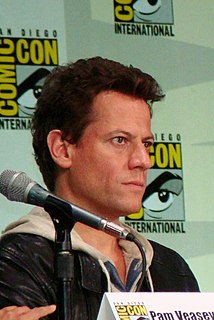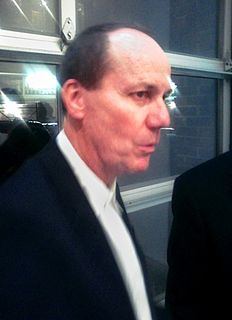A Quote by Jonny Lee Miller
It's very strange to become a character: the lines get blurred, and you start to sort of, I don't know, take it home too much?
Related Quotes
When you're a father in a marriage, you sort of become the mother's assistant, and you sort of get a list from her every day, and you do, you know, you run down the list, and it feels very much like a chore. And a lot of fathers live in kind of an avoidance. They sit on the toilet for several hours a day... Oh, honey, it took me 40 minutes to go to the post office... But once you become a dad without the mom there, you have to take it all on, and you sort of activate male skills that you didn't know you could apply to fatherhood.
Our moment had passed somehow. I was different. He was, too. Without our “madness” to unite us, there wasn’t anything much there. Or maybe too much had happened in too short a time. It’s like when you take a trip with someone you don’t know very well. Sometimes you can get very close very quickly, but then after the trip is over, you realise all that was a false sort of closeness. An intimacy based on the trip more than the travellers, if that makes any sense.
When I take on a character, it's a sacrifice. There's something that you give up every time. I want to become these characters, and I want to be mysterious, but if you know too much about me, it's not going to be too much fun watching me play a character, because it's just going to be me with a mask on, instead of you believing what the mask is.
It's really an organic sort of process. You start off with the character on the page. You fall in love with that character and you have to represent that character well and I think it's just an evolution there. Using the accent and speaking the lines with the accent in fact opens the door to who the character really is.
No relationships are perfect. When they develop, there are things that have happened before in your life that you maybe don't discuss. And there are always fault lines within every relationship. I believe it doesn't take too much pressure to be placed on those fault lines for them to start cracking apart.
You might have, as a character, 30 pages of dialogue a day if you're what they call a 'front-burner story.' So you go home, you learn your lines for the next day, you get up, you're there at 7 in the morning, you do a quick rehearsal, you're on camera, you might leave, you know, at 7 at night and start the whole thing over again.
What I didn't realize about television was that's true of acting, as well. You have that space of time to develop who you are, and you can use more and more of yourself. The lines between that character that I'm playing and myself become more and more blurred and, after awhile, they just disappear, altogether.
Stand alone books are nice because they have everything all in one tidy little package. Neverwhere was awesome because you get action, adventure, character development, the exploration of a strange world, PLUS resolution of all the problems and mysteries at the end. No lines no waiting. That's very satisfying. Multi-volume stories are satisfying too, just in a different way.
Yes, I am one of those people who feels that most of my work is adaptation of one sort or another. For me, it's a way to jump-start the engine. For example, some people use the technique of basing a character on a friend. They start writing with his or her voice, then at a certain point, the character takes off on his or her own. It probably no longer resembles the model, but it helped the author to get going. I find that's true of form, too. For every play I've written, I know what play I was trying to imitate. That helps me get going.
You get to know a character that you play on-stage in a pretty profound way over a length of time. I don't want to sound highfalutin and say you become the character, you just start bringing more and more of yourself to the part until the character and actor, it's hard to tell them apart. It's some weird amalgam. In film, because of the period of time, I don't know that you ever get that deep into it.
I think with success you do get a little more guarded and you start to change your friends. You become more isolated. And you start hanging around with people who have money! I think that's the biggest thing. Once you do get a bit of change in your pocket, you start hanging around with other people who have some change. It was kind of strange to all of a sudden go from one extreme-Manhattan-to where I went, upstate New York. But I did it because I was dying in the city. I couldn't take it. I couldn't take one more dinner party. I couldn't take one more party, period.



































